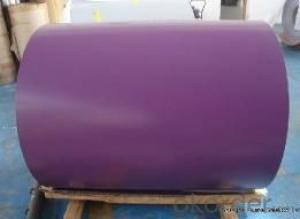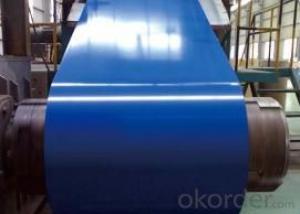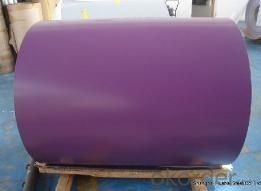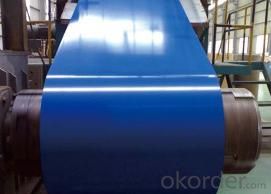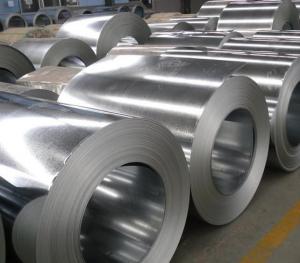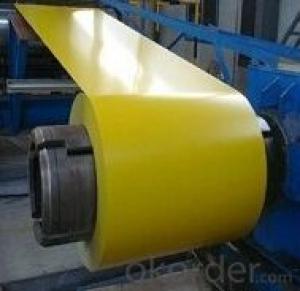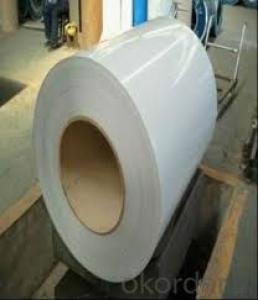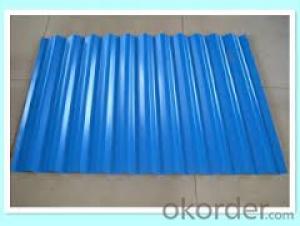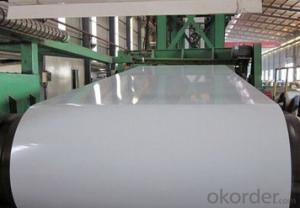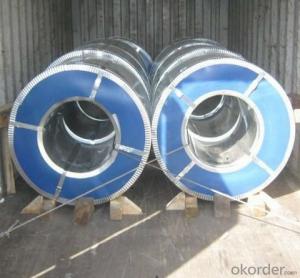Color Coated Galvanized Steel Coils (PPGI/PPGL)
- Loading Port:
- Shanghai
- Payment Terms:
- TT OR LC
- Min Order Qty:
- 30 m.t.
- Supply Capability:
- 10000 m.t./month
OKorder Service Pledge
OKorder Financial Service
You Might Also Like
Basic Info.
Model NO.:cgcc
Surface Treatment:Coated
Technique:Galvanized
Standard:JIS
Application:Container Plate
Edge:Mill
Stock:Stock
Steel Grade:CGCC, Dx51d, SGCC
Color:Ral 1015, 5002, 6005, 8017, 9002, 9006, 9010 etc.
Thickness:0.16-1.0mm
Width:914/1000/1200/1219/1220/1250mm
Base Metal:Galvanized or Galvalume Steel
Zinc-Coating:Z50-150G/M2 or Az40-100G/M2
ID Coil:508mm
Coil Weight:3-5 Mt
Painting:20-25miu on Top / 5-8miu on Back
Type of Coating:PE Smp PVDF
Export Markets:North America, South America, Southeast Asia, Eastern Asia
Additional Info.
Packing:Standard Export Seaworthy Packing In20′′ Container
Standard:0.14-1.0*914-1250*C
Origin:China
HS Code:72107010
Production Capacity:100000tons Per Year
Product Description
Color-coated Galvanized/Galvalume Steel Coil (PPGI/PPGL)
1. Techinical standard: EN10169
2. Grade: TDX51D, TSGCC
3. Color: Ral standard or according to customers' requirment
4. Thickness: 0.14-1.0mm (0.16-0.8mm is the most advantage thickness)
5. Width: 600-1250mm (610/724/820/914/1000/1200/1219/1220/1250mm)
6. Base metal: Galvanized / galvalume steel
7. Finish Painting: 15-20miu PE on top 5-8miu EP on back
8. Color: Ral standard
- Q: How are steel coils used in the HVAC industry?
- Steel coils are commonly used in the HVAC industry as a key component in air conditioning and heating systems. They are used to transfer heat energy, allowing the system to cool or heat the air efficiently. The steel coils act as heat exchangers, absorbing heat from the air and releasing it into the environment or vice versa. This process helps regulate the temperature and improve the overall performance of HVAC systems.
- Q: What are the main factors that affect the price of steel coils?
- The main factors that affect the price of steel coils include the cost of raw materials such as iron ore, coal, and other alloys, supply and demand dynamics in the steel industry, production and transportation costs, fluctuations in currency exchange rates, and government policies and regulations. Other factors such as global economic conditions, trade tariffs, and market competition also play a significant role in determining the price of steel coils.
- Q: where can i find information online about steel residential homes that use solar energy?
- Steel okorder
- Q: Can steel coils be coated with holographic patterns?
- Yes, steel coils can be coated with holographic patterns. This process involves the application of a holographic film or coating onto the surface of the steel coils, creating a visually appealing and unique holographic effect. This coating can be used for various purposes such as branding, security, or aesthetics in industries like automotive, packaging, or electronics.
- Q: How are steel coils processed and shaped for specific applications?
- Steel coils are processed and shaped for specific applications through a series of manufacturing processes. These processes typically include cleaning, pickling, cold rolling, annealing, and slitting. Cleaning removes any surface impurities, pickling removes scale and oxides, cold rolling reduces the thickness and enhances the strength, annealing improves ductility and reduces hardness, and finally, slitting cuts the coils into desired widths. These steps ensure that steel coils are transformed into the appropriate shape and size required for specific applications, such as in construction, automotive, or manufacturing industries.
- Q: How do steel coil manufacturers meet customer specifications?
- Steel coil manufacturers meet customer specifications by carefully analyzing the requirements provided by the customer and utilizing advanced production techniques to ensure precise dimensions, mechanical properties, and surface finishes. They employ strict quality control measures throughout the manufacturing process, including rigorous testing and inspections, to ensure that the coils meet the specified standards. Additionally, manufacturers often collaborate closely with customers to understand their unique needs and provide customized solutions that meet or exceed their expectations.
- Q: Can steel coils be used in marine environments?
- Although steel coils can be utilized in marine environments, it is crucial to take necessary precautions to avoid corrosion. Given that steel is susceptible to corrosion when exposed to moisture and saltwater, which are commonly found in marine environments, it is imperative to employ protective measures on the steel coils. One such method is treating them with protective coatings like galvanization or painting to establish a shield between the steel and the corrosive elements. Moreover, regular maintenance and inspections should be conducted to detect any signs of corrosion and promptly address them to prevent further harm. By implementing these measures, steel coils can be effectively employed in marine environments while minimizing the risk of corrosion and ensuring their durability and performance.
- Q: Why can't you use a lead shot only choke with steel shot or a steel shot only choke with lead shot? I have used a lead only choke with steel shot and my shotgun shot fine and there was no damage to the choke.
- To add to this, Screw-In tubes in older guns can make removal a challenge. I destroyed a FULL lead tube removing it for a friend from his NOVA.
- Q: What are the major challenges faced by steel coil manufacturers?
- Steel coil manufacturers encounter various obstacles across different areas. These challenges can be grouped into several key categories. Firstly, one of the primary hurdles is the fluctuating prices of raw materials, such as iron ore and coal, which are vital for steel production. To maintain profitability, manufacturers must constantly monitor and adjust their pricing strategies to mitigate the impact of these fluctuations. Secondly, intense competition arises from both domestic and international players in the steel coil manufacturing industry. Globalization has increased the availability of steel coils from various regions. Therefore, manufacturers must differentiate themselves through quality, pricing, and customer service to remain competitive. Thirdly, the steel industry is continuously evolving and adopting new technologies. Manufacturers need to invest in modern equipment and machinery to improve efficiency, reduce costs, and meet stringent quality standards. However, keeping up with technological advancements can be challenging, particularly for smaller or financially unstable manufacturers. Fourthly, steel production is a resource-intensive process that significantly impacts the environment. Governments worldwide have imposed stricter regulations on emissions, waste disposal, and energy consumption. Compliance with these regulations requires substantial investments in pollution control technologies and sustainable practices. Fifthly, the steel industry requires a skilled workforce with expertise in areas such as metallurgy, engineering, and operations. However, attracting and retaining skilled employees is challenging due to a shortage of qualified personnel. Manufacturers must invest in training and development programs to ensure a competent workforce and maintain operational excellence. Sixthly, steel coil manufacturers are highly sensitive to economic fluctuations. During economic downturns, demand for steel products decreases, leading to excess capacity and lower profit margins. Conversely, during economic booms, manufacturers may struggle to meet increased demand and ensure timely delivery. Lastly, transportation and logistics present a significant challenge for steel coil manufacturers due to the bulky and heavy nature of their products. Optimizing supply chain management, coordinating with freight partners, and ensuring timely delivery across various geographies can be complex and costly. In conclusion, steel coil manufacturers face challenges in several areas, including raw material costs, global competition, technological advancements, environmental regulations, skilled workforce requirements, economic volatility, and transportation logistics. Overcoming these challenges necessitates proactive strategies, continuous improvement, and a focus on innovation to remain competitive in the industry.
- Q: hi i was doing a little history project on guns. i was just wondering if anyone could help me find out what material was used before steel and why this material wasnt as good as steel ( its faults)thanks for your help
- Gunmetal is a specific type of brass
Send your message to us
Color Coated Galvanized Steel Coils (PPGI/PPGL)
- Loading Port:
- Shanghai
- Payment Terms:
- TT OR LC
- Min Order Qty:
- 30 m.t.
- Supply Capability:
- 10000 m.t./month
OKorder Service Pledge
OKorder Financial Service
Similar products
Hot products
Hot Searches
Related keywords
